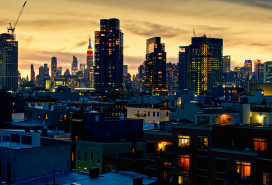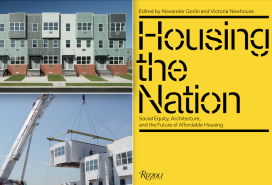Ask Sam: What makes a NYC apartment illegal? Are there consequences for tenants?

An apartment might be illegal if a below-grade basement space is being used as a bedroom.
What would make an apartment illegal? And what happens to tenants who live there?
There are several conditions under which an apartment could be considered illegal, says Sam Himmelstein, a lawyer who represents residential and commercial tenants and tenant associations, and the consequences vary depending on the circumstances.
One of the most common situations occurs when a landlord creates a duplex apartment that includes a basement and markets that underground space as a bedroom.
“If there are no window and the space is below grade, that’s illegal—the space is considered a rec room, not a bedroom,” Himmelstein says. “This is a very common illegal use. Always be suspicious of bedrooms in the basement.”
According to Housing and Preservation Development, basement apartments cannot be rented legally unless they meet specific requirements for air, light, sanitation, and means of egress.
“Occasionally we also see situations where there’s an apartment that’s entirely in an attic or basement, which is generally illegal,” Himmelstein adds.
Another form of illegal apartment are single room occupancy units that have been converted illegitimately to standard apartments. In some cases, landlords fail to update the building’s certificate of occupancy or certificate of no harassment when they undertake the conversion.
“If you’re suspicious about this, go on the DOB website and see if your building has a CO. If it does, see if the apartment you're renting, or the general use of building, seems to conform with the CO,” Himmelstein says. “If the CO says every floor of the building has individual, hotel-like rooms and you're being rented an apartment with a kitchen, bathroom, and bedroom, it’s probably an illegal apartment, and the landlord would have had to amend CO to reflect that different use.”
There are other types of CO violations that could make an apartment illegal. Some apartments, for instance, may have been zoned for commercial use, intended to be used as doctors’ offices or retail spaces, but are being rented illegally as residential units instead.
And in new residential developments, landlords may be granted a temporary CO from the Department of Buildings, and then fail to get a permanent one when that expires. Buildings without the appropriate CO can’t be legally occupied, so again, check your building’s status with the DOB if you have reason to be suspicious.
An apartment may be illegal if bedrooms have been added improperly.
“Landlords sometimes put up temporary pressurized walls to create illegal rooms,” Himmelstein says. “Rooms have to be a certain size and have a certain amount of light and air, and very often, these walls create a situation where you have a windowless bedroom, which is illegal.”
An increasingly common situation is landlords renting bedrooms, rather than apartments, directly to tenants. “That’s illegal—there should be no separate leases for rooms,” Himmelstein says. One of the main reasons this is against the law is that landlords in these situations place internal locks on the bedrooms that they rent out individually, creating a fire hazard.
“If there’s a fire and the only way out is through a bedroom that is locked, and it impedes your ability to escape, that’s a major hazard,” Himmelstein says. “This also violates anti-SRO laws, by turning Class A apartments into mini SROs.”
Finally, apartments are also rendered illegal for occupancy if the Department of Buildings or the Department of Housing Preservation and Development has put a vacate order on a building.
This situation often arises when a building has become structurally unsafe to occupy. Typically, the DOB will immediately issue a vacate order on such a building, leaving tenants a few minutes to take their essentials and then get out.
“When the city puts a vacate order on a building, it’s really a vacate and repair order,” Himmelstein says. “They’re telling the tenants they can’t be there, and the landlord that they have to fix this.”
Himmelstein’s firm handled a case like this for a building on East 34th Street that was critically damaged by a construction project next door. When tenants felt their building shaking, they contacted the authorities, who issued a vacate order. After negotiation, the landlord and developer paid for the tenants to relocate, and after repairs were made and DOB engineers convinced the building had been stabilized, they were restored to their apartments.
In cases like this, landlords can interpose one defense—economic infeasibility.
“The landlord could claim the cost of fixing the building would exceed any profit they could make. They would then be relieved of their obligation to restore the tenants. When that happens, the tenants could sue the landlord for damages if they can prove the problems occurred as a result of neglect,” Himmelstein says.
If you discover that your apartment is illegal for one of these reasons, you may be able to withhold your rent until the landlord remedies the situation. Keep in mind that there is the risk your landlord might sue you in response, which could land you on the tenant blacklist; there’s also the risk that if conditions in your apartment are determined to be dangerous, you’ll need to move out right away.
However, if you win in Housing Court, you could end up with the right to live in your apartment rent-free until the lease expires, or until the landlord remedies the problem. You could also end up being reimbursed to relocate, or even bought out of your apartment.
And if you are rent-stabilized, you would still have a right to a renewal lease, but the landlord might bring an eviction proceeding claiming that the use of the apartment is illegal—even if the landlord is responsible for that illegality. However, a Housing Court judge would likely order the landlord to legalize the apartment, and not evict the tenant unless legalization was impossible.
Related:
Ask Sam: I just found out my apartment is illegal. What should I do? (sponsored)
Ask Sam: What happens if my building doesn't have a certificate of occupancy? (sponsored)
Ask Sam: What kind of problems qualify me for a rent abatement? (sponsored)
Ask Sam: How do I find out if my apartment should be rent-stabilized--and if the landlord owes me money? (sponsored)
Read all our Ask a Renters Rights Lawyer columns here.
Sam Himmelstein, Esq. represents NYC tenants and tenant associations in disputes over evictions, rent increases, rental conversions, rent stabilization law, lease buyouts, and many other issues. He is a partner at Himmelstein, McConnell, Gribben, Donoghue & Joseph in Manhattan. To submit a question for this column, click here. To ask about a legal consultation, email Sam at shimmelstein@hmgdjlaw.com or call (212) 349-3000.



























